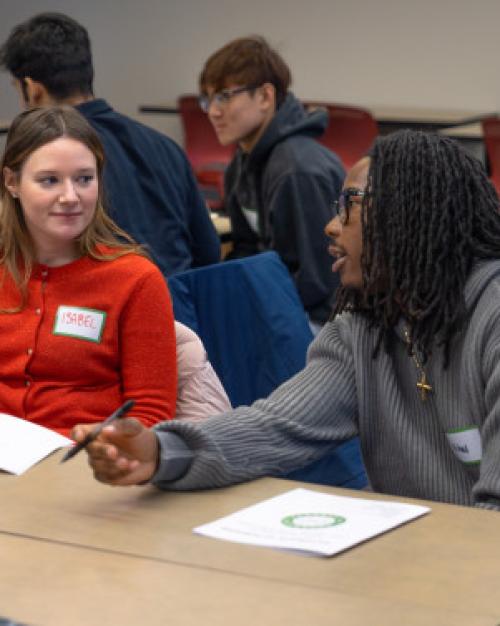The stark economic realities and inequalities in the United States have been laid bare by the uneven impact of the COVID-19 pandemic. Great financial gains for some, stand in contrast to the financial losses that have fallen heaviest on those who can least afford them, spotlighting the impact of racism on federal, state and local economic policies and outcomes.
In the final webinar of the College of Arts and Sciences’ (A&S) yearlong series, “Racism in America,” panelists will focus on the many ways that racism shapes economic policies, and how economic policies shape inequality in America. The April 27, 7 p.m. event, in partnership with the School of Industrial and Labor Relations, is free and open to the public; registration is required.
Moderated by Washington Post reporter Tracy Jan, the webinar will feature four Cornell faculty experts looking at the past as well as present of the relationship of racism to capitalism and the unequal impact of COVID-19 on different sectors of the economy. They will explore the intersection of labor history and racism, modern capitalism’s roots in racial oppression, and what major labor market indicators of structural racism say about conditions generally and post-pandemic.
“In relation to racism, our economic system is like an invisible thread that we know is there, but don’t always bring fully into focused view. This webinar is our attempt to bring both the thread, and the larger race-based social tapestry fully into the light,” said Noliwe Rooks, the W.E.B. Du Bois Professor in Africana studies and director of the American Studies Program in A&S.
Jan covers the intersection of race and the economy for The Washington Post, a beat she launched in December 2016 that encompasses racial economic disparities, immigration, housing policy and other stories that hold businesses and politicians accountable for their decisions and promises. Her work has delved deeply into reparations for slavery, systemic racism in America, and the economic and health impact of the coronavirus pandemic on Black, Asian, Latino and immigrant communities. She previously was a Washington-based national political reporter for The Boston Globe and was a Knight-Wallace Fellow at the University of Michigan, as well as a Fulbright Fellow in Taiwan.
The panelists for the April 27 webinar are:
- Lawrence Glickman is the Stephen and Evalyn Milman Professor of American Studies in the Department of History (A&S). He is a core faculty member in the History of Capitalism Initiative and the author or editor of five books, including “Free Enterprise: An American History (2019) and Buying Power: A History of Consumer Activism in America. He also writes on public affairs for the Atlantic, Washington Post, Boston Review, Dissent, and other periodicals. At Cornell, he teaches a popular course on “Sports and Politics in American History” and has co-taught with Professor Edward E. Baptist, “The History of American Capitalism,” as well as a variety of lecture and seminar courses on political, cultural, and intellectual history.
- Tejasvi Nagaraja is an assistant professor of history in the School of Industrial and Labor Relations (ILR). His research and teaching explore the intersections of labor and African American and foreign relations history. Nagaraja is writing a book about America’s World War II experience and generation. It reconstructs a far-flung war within the war, among Americans themselves. This transnational story braids military-industrial labor battles, Black soldiers’ protest against policing and incarceration, and veterans’ debates about America’s role in the world. Diverse war workers led a ‘greatest generation’ of labor, Black freedom and other social movements, which linked racial and economic and geopolitical contentions.
- Erica Groshen is senior economics advisor in the ILR Labor Dynamics Institute (ILR) and research fellow at the Upjohn Institute for Employment Research. From 2013 to 2017, she served as the 14th commissioner of the U.S. Bureau of Labor Statistics, the principal federal agency responsible for measuring labor market activity, working conditions, and inflation. Before that, she was vice president in the Research and Statistics Group of the Federal Reserve Bank of New York. Her research has centered on jobless recoveries, wage rigidity and dispersion, and the role of employers in the labor market.
- Riché Richardson, an associate professor of Africana studies in the College of Arts & Sciences. Her areas of interest include African American literature, American studies, black feminism, gender studies, Southern studies, cultural studies and critical theory. Her books include “Black Masculinity and the U.S. South: From Uncle Tom to Gangsta” and “Emancipation's Daughters: Reimagining Black Femininity and the National Body.” Richardson is also a visual artist; her mixed-media appliqué art quilts have been exhibited in solo shows at the Rosa Parks Museum in Montgomery and included in national exhibitions, including “Quilts for Obama” curated by Roland Freeman at the Historical Society of Washington, D.C., in 2009.
Co-hosted by the American Studies Program, the “Racism in America” series is supported by Alumni Affairs and Development; Diversity Alumni Programs; and powered by eCornell. Other colleges have been partners on the series’ other webinars.
Linda B. Glaser is news and media relations manager for the College of Arts & Sciences




